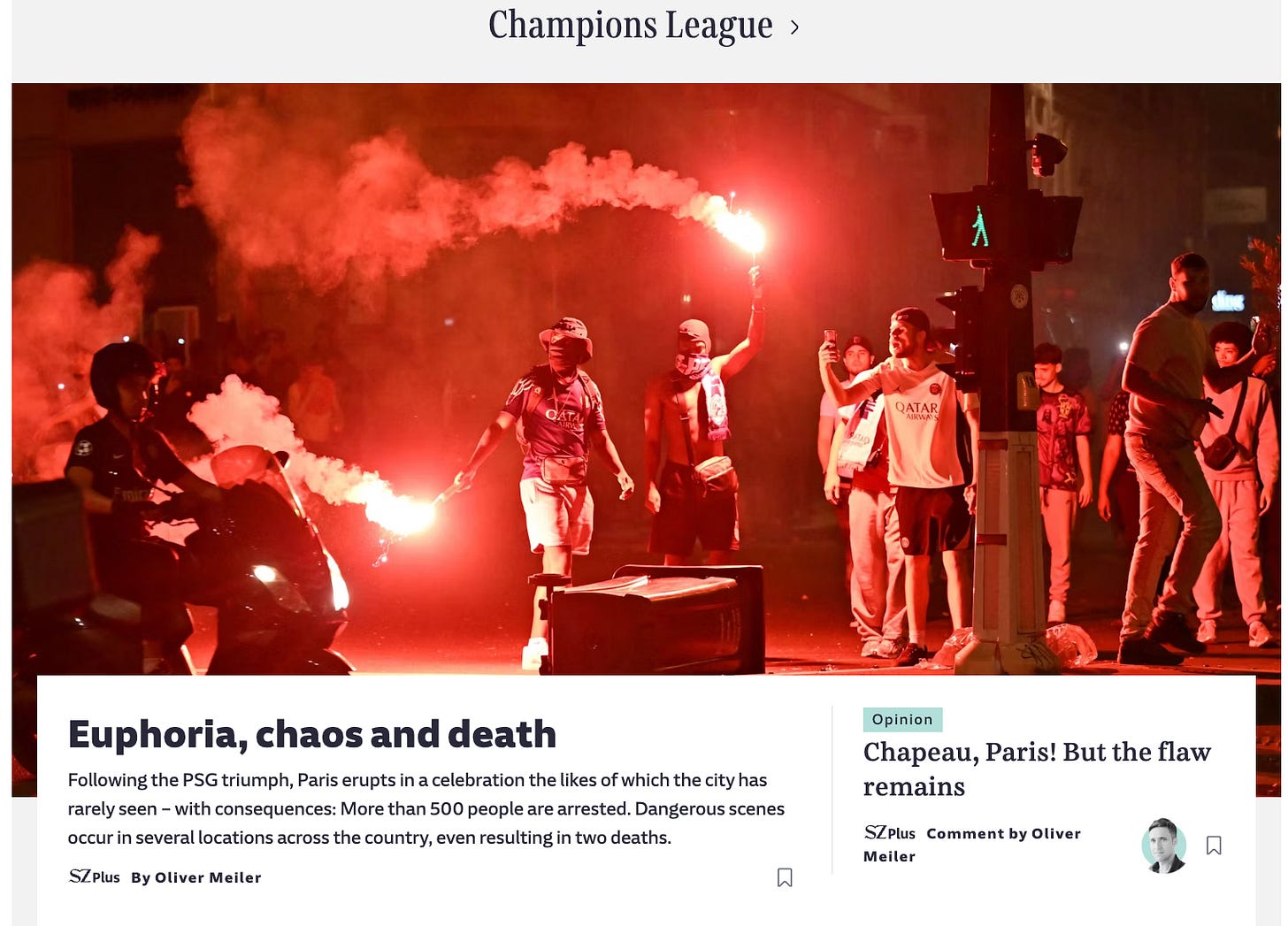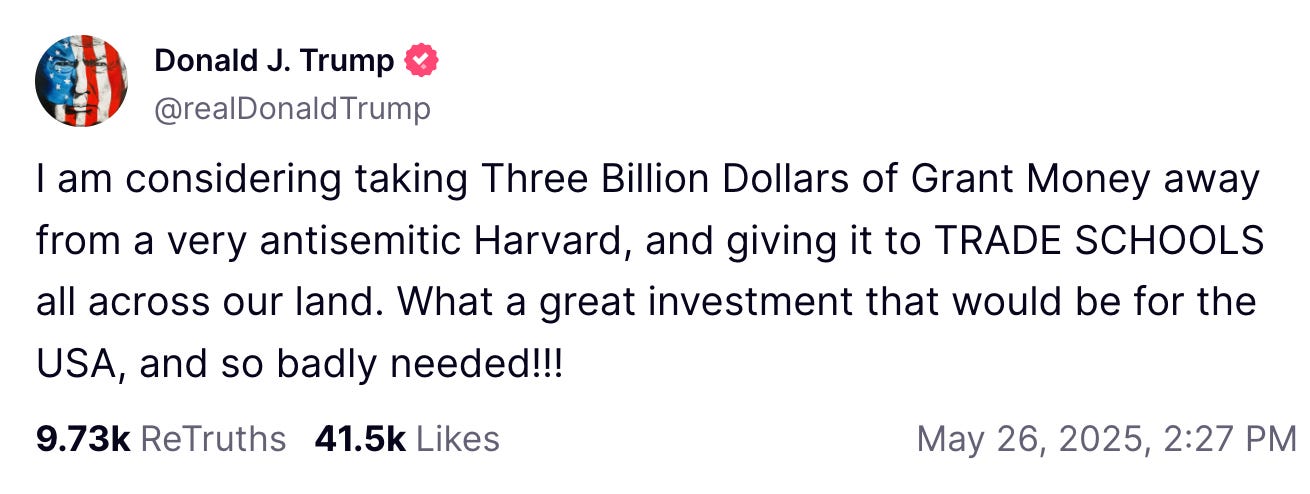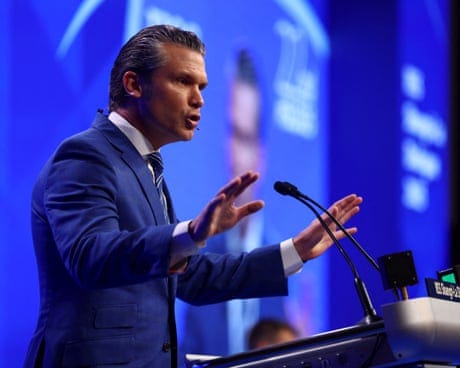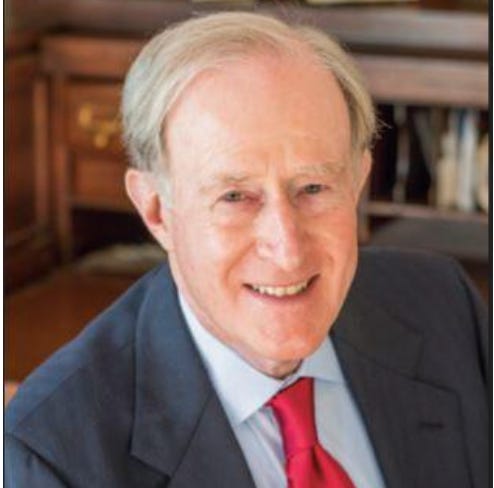TWTW: The World This Week #145
Eclipsing even Trump takes a lot ... backlash in Europe, Asia ... more Harvard swipes ... Elections: Poland, South Korea ... For our paid: Latin revenge plus our global cartoon portfolio
In this weekly feature for Andelman Unleashed, we continue to explore how the media of other nations are reporting and commenting on the United States, and how they are viewing the rest of the world.
To emphasize, we cover lots of ground—diving each week through 30+ newspapers & 100+ websites on every continent to distill the world. So, you may not want to read it all, but it's all here for you!
Coming to you this week again from Paris….where on Friday, for our (lightly) paid members, we will be hosting the extraordinary Harvard economist, Prof. Benjamin Friedman, live from Cambridge, as our celebrity guest, with so very much to discuss.
The Game….!
Eclipsing even Donald Trump and his TACO administration, in Europe certainly, not to mention Paris, was the shutout 5-0 victory of the football (or soccer depending on which side of the pond you may be located) club Paris St-Germain (PSG) against the luminary team of Italy (Inter Milan) for the League of Champions cup—the Super Bowl, World Series, and Stanley Cup all compressed into one stunning 90 minutes of ‘le foot.’
And then, not surprisingly, Paris went into the streets in a frenzy of excitement, leaving 300 under arrest, two fans dead, and a score of police injured, one in a coma, cars incinerated, impromptu fireworks into the wee hours of the morning. And ecstasy as well ….
Qatar—long seeking to punch far beyond its weight, from a central role in a host of crises as diplomatic mediator to its heft as an international investor—purchased a financially-strapped PSG more than 11 years ago for €50 million ($56.7 million), bought new talent for $1 billion, and now sits on a team worth some $4.4 billion by a Forbes estimate. But of even greater importance for Qatari ruler, Sheik Tamim bin Hamad Al Thani, Saturday night saw his nation’s name and logo plastered across the chests of winners—and millions of fans across Europe.
On Sunday, came the return of PSG to Paris, a pass by the Arc de Triomphe, down the Champs Elysées in a victory parade, to the finale—a reception by their biggest fan, Emmanuel Macron, in his home—the Elysées Palace.
How others see America
It was another week of ups and downs in TrumpWorld, which Wall Street and a widening circle of skeptics have dubbed TACO [Trump Always Chickens Out] with reference to his on-again off-again tariffs and so much more havoc. So, there have certainly been more Trump banner headlines in Europe….
Trump tariffs: the big fog
After two consecutive court rulings, the uncertainty surrounding the tariffs imposed across the planet by the American president is total.
This unprecedented situation bears witness to the violence of the ongoing confrontation between Trump and judges concerned with respecting the rule of law.
While awaiting a decision on the merits, likely from the Supreme Court, businesses and states will have to navigate blindly
A question arises for the United States' trading partners: is it in their interest to sign an agreement quickly
And the editorial that follows:
The United States: An indispensable call to order
[America’s] balance of powers are directly affected by the president's authoritarian tendencies. In an ideal Republic, the call to order should have come from Congress itself. Unfortunately, the servility of Republican elected officials toward Donald Trump means that they will be the last to defend these rights. It is therefore up to the highest judicial body in the United States to recall, despite its conservative majority, that in a democracy, executive power is not unlimited.
If there is an emergency in the United States right now, it is such a clarification, given the White House's stubborn desire to ignore legal norms. The immigration issue has thus become the scene of a guerrilla war: the Trump administration regularly approaches institutional crisis by paying little heed to the injunctions addressed to it following the invocation, at random, of sometimes antediluvian laws. Donald Trump cannot ignore that the greatness of America depends on respecting the principles it has set for itself.
Backlash in Asia ….
As Hong Kong’s South China Morning Post uncovered….
US retailers have been locked in talks with Chinese producers for weeks over how to handle the additional costs caused by the trade war, with the firms facing intense political pressure at home to “eat the tariffs” and keep prices stable.
Walmart and other major US retail groups previously agreed to bear the full cost of the tariffs when they asked their Chinese suppliers to resume shipments in late April. But global brands including several US retail giants are now pushing suppliers in both China and parts of Southeast Asia to absorb a large chunk of the cost of the levies, according to sources from suppliers serving companies including Walmart, Target, Nike, Puma and Adidas….
Walmart agreed to cover the full cost of any tariffs until August in its previous deals with one stationery maker, but the US retailer has yet to place any orders beyond August. One Zhejiang manufacturer is capable of footing about 30% of the additional costs from the tariffs, but there is “no room” to go up to 50% or higher. The company has yet to reach an agreement with Walmart.
And in Washington, a ‘démarche’
The SCMP continued with this dispatch from Bochen Han:
The Chinese embassy in Washington lodged an official protest with the United States amid a growing backlash about a decision to “aggressively” revoke Chinese student visas that has prompted accusations of xenophobia. The formal protest—officially known as a “démarche”—came a day after Secretary of State Marco Rubio announced that his department would work with the Department of Homeland Security to cancel the visas of Chinese students.
These include students working in “critical fields” and with “connections” to the Communist Party. The plans also include increased scrutiny of future visa applicants from mainland China and Hong Kong. China’s foreign ministry had hit back against the move earlier in the day, but the embassy’s move marks an escalation.
While démarches are a routine diplomatic tool, they are not usually delivered publicly. “The Chinese side is firmly opposed to this politically motivated and discriminatory action,” the embassy said in a statement. “The Chinese embassy in the United States has lodged a solemn démarche with the US side without delay, urging the US government to immediately correct its mistakes and ensure the legitimate rights and interests of Chinese students.”
At a briefing with reporters earlier in the day, department spokeswoman Tammy Bruce said Rubio’s decision was crucial to protecting US national security, accusing Beijing of “exploitation of US universities or theft of US research”.
There’s always Harvard
And for its 374th commencement ceremonies on Thursday, with thousands parading in caps and gowns, their families and friends beaming with pride in Tercentenary Theater created in Harvard Yard that during the year pulses with students from every continent hustling to classes, the fear is that the Trump administration could make this a very different place a year from now.
Asians, Asian Americans, Pacific Islanders [AAPI] define themselves at Harvard’s commencement procession
But leave it to Singapore to chart the way as Gautam Mukunda wrote in The Straits Times….
A weaker Harvard is a weaker America
The White House attacks could damage an institution that plays a vital role in the US economy and its power abroad. Imagine if China or Russia tried to destroy a US asset that generates tens or even hundreds of billions of dollars of economic value, plays a major role in American leadership in science and technology, and turbocharges its prestige and soft power.
We’d expect the US government to go to war to defend it. But in attacking Harvard University, that’s exactly what the Trump administration is trying to do.
Despite the school’s failures and flaws, it remains a vital national asset—and the administration’s actions are far more dangerous to America than they are to Harvard. Universities are enormously resilient and count time in centuries, not electoral cycles. Long after the Trump administration is gone, there will still be a Harvard.
But an America deprived of everything Harvard contributes will be far poorer and weaker.
And then there’s America’s competition
Asia is where French President Emmanuel Macron took his battle to restructure trade and cooperation as Trump seeks to remake the world in his image….just as much of the world sees Trump being backed increasingly into a corner without anything but a much hoped-for TACO resolution. So Politico Europe’s Koen Verhelst and Jakob Weizman write from Brussels:
Trump court turmoil strengthens EU hand in tariff talks
BRUSSELS — A flurry of U.S. court rulings over the legality of President Donald Trump’s tariffs have strengthened the EU’s hand in ongoing negotiations, European trade war watchers say.
Italian Member of the European Parliament Brando Benifei, who sits on the trade committee and visited the U.S. this week with fellow lawmakers, thinks the possibility of the tariffs ultimately being ruled unlawful will speed up talks….
As the twists and turns of the trade war play out across the global stage, it looks more and more like the European Commission’s wait-and-see approach to Trump’s tariffs is paying off….The EU executive, which leads on trade policy for all 27 countries, has been preparing a tariff retaliation package that would hit around €116 billion worth of U.S. exports to the EU, while also repeatedly offering a zero-for-zero tariff deal to Trump.
Meanwhile, increasingly, it is becoming clear that the United States is risking its lead as a world power on so many fronts, but especially in terms of its ability to innovate and attract talent that can keep it in a leadership position globally. After Donald Trump threatened to redirect grants to Harvard …..
…one leading French official observed, “does the United States really want to become a world leader in welding and tool building rather than innovation and scientific discovery?” And India Today’s science desk wrote:
Foreign universities poaching top US scientists hit by Trump-era budget, job cuts
Since President Donald Trump took office, his administration has slashed billions of dollars from agencies like the National Institutes of Health (NIH), National Science Foundation (NSF), and NASA…
A wave of job losses and funding cuts under the Trump administration has triggered a surge in international recruitment efforts, as universities and governments across the globe seek to attract US scientists facing uncertain futures at home. The dramatic reduction in federal support for research has not only shaken the American scientific community but also opened the door for a potential brain drain, with foreign institutions offering safe havens and competitive incentives. The proposed budget for next year calls for a 40% cut to the NIH and a staggering 55% reduction for the NSF.
These measures have already led to hiring freezes, layoffs, and canceled grants at major US universities, leaving thousands of scientists—especially early-career researchers—scrambling for opportunities.
Sensing an opportunity, governments and universities worldwide have launched aggressive recruitment campaigns. Canada’s "Canada Leads" program, announced in April, aims to bring early-career biomedical researchers north, promising resources and a supportive environment. France’s Aix-Marseille University introduced the "Safe Place for Science" initiative in March, pledging to welcome US scientists who feel "threatened or hindered" in their research. Australia, too, has rolled out its "Global Talent Attraction Program," offering competitive salaries and relocation packages to lure top talent. European leaders have also moved to enshrine academic freedom in law, with the European Union’s "Choose Europe for Science" campaign seeking to capitalise on the moment.
The response has been swift: nearly half of the 300 applications to France’s "Safe Place for Science" came from US-based researchers, and the Max Planck Society in Germany reported a threefold increase in applications from American scientists to its Lise Meitner Excellence Program. Recruiters note a 25–35% rise in inquiries from US scientists, many of whom are motivated less by money than by the desire to continue their research without political interference.
The trend is clear: foreign institutions are actively courting US talent, and many American scientists are seriously considering offers abroad….The coming months will reveal whether the US can stem the tide—or if the world’s laboratories will gain a new generation of American pioneers.
Meanwhile, French President Emmanuel Macron lost no time taking his efforts on the road to three Asian power houses—Vietnam, Indonesia, and Singapore.
While it was his wife’s slap at the door of the presidential jet that captured the world’s attention (and Donald Trump’s remark that the lesson was simply to keep the door closed), when he finally made it to the ground in Hanoi, President Macron spent no time affirming a new era in relations between countries that once waged war against each other, as France 24 reported:
Macron continued pitching his country as a reliable alternative partner to the United States and China. Macron said that Paris would engage in closer cooperation with Vietnam on defence, satellites and railways. During a press statement alongside his Vietnamese counterpart Luong Cuong in Hanoi, Macron said a rules-based order was necessary at "a time of both great imbalance and a return to power-driven rhetoric".
Deals signed during Macron’s visit covered the plane purchase, cooperation on nuclear energy, railways, Airbus earth-observation satellites and Sanofi vaccines. Macron reiterated France’s support of freedom of navigation, an issue dear to Vietnam as it often clashes with Beijing over contested boundaries in the South China Sea. Macron added the partnership with Vietnam "entails a reinforced defence cooperation", citing the signing of multiple projects on defence and space.
France ruled the Southeast Asian country for about 70 years until it was forced out in 1954 after a major defeat at Dien Bien Phu in northern Vietnam. Ties have improved in recent decades, being upgraded last year to Vietnam’s highest level.
At the same time, Secretary of Defense Pete Hegseth did little to promote American leadership with a debut speech at the Shangri-La conference in Singapore—received with little pleasure in China or its neighbors, as The Guardian’s Helen Davidson reported….
China’s government has accused Pete Hegseth of trying to “sow division” in the Asia Pacific region over his speech at a Singapore defence conference where he warned China was a potentially “imminent” threat.
Hegseth [had] said China was “credibly preparing to potentially use military force to alter the balance of power in the Indo-Pacific”, and was rehearsing for “the real deal” of invading Taiwan. “There’s no reason to sugar coat it. The threat China poses is real, and it could be imminent,” the US defence secretary said, calling for Asian countries to increase defence spending.
On Sunday, China’s ministry of foreign affairs condemned his words, which it said were “filled with provocations and intended to sow division”.
“Hegseth deliberately ignored the call for peace and development by countries in the region, and instead touted the cold war mentality for bloc confrontation, vilified China with defamatory allegations, and falsely called China a ‘threat’,” it said. “The remarks were filled with provocations and intended to sow division. China deplores and firmly opposes them and has protested strongly to the US.”
The statement also pushed back at Hegseth’s claim that China was trying to become a “hegemonic power” in the region. “No country in the world deserves to be called a hegemonic power other than the US itself, who is also the primary factor undermining the peace and stability in the Asia-Pacific,” it said.
Meanwhile Australia’s newly re-elected Prime Minister Anthony Albanese replied as well to Hegseth’s challenge:
“We’ll determine our defence policy, we’ve invested, just across [the next four years], an additional $10bn in defence,” the prime minister said. “What we’ll do is continue to invest in our capability but also our relationships in the region.
As for the future,The Economist of London appears to be especially pessimistic—so much so that it toyed with four different covers portraying a host of apocalypses toward which Trump appears to be plunging his country…and the world. As deputy editor David Carr observed:
Our argument stands on three ideas: that the structure of American finance is unrecognisable from a decade ago; that the new architecture contains risks which are poorly understood; and that the Trump administration is creating the conditions which will put this new structure under enormous strain—with potentially grave consequences.
Under Mr Trump a toxic combination of uncertainty, institutional conflict, volatile asset prices, higher capital costs and economic weakness threatens to put the new-look financial system under almighty strain. If the biggest of the giant firms were left to fail, it could lead to a global credit crunch.
They went with the one on the right as Carr concluded:
This cover divided us. Some found its lack of people cold and forbidding. Others were drawn to the elegance of its message. It is unusual for a cover to map so neatly onto the themes of a complicated message.
Special for the Paid !
Andelman Unleashed has unleashed new, (lightly) paid tiers. For new paid subscribers, an inscribed copy of my latest book, A Red Line in the Sand. Along with a weekly portfolio of cartoons, largely from Cartooning for Peace … and Friday a weekly live conversation with Andelman. Back next Friday, June 6, with a very special guest, live from Cambridge:
The William Joseph Maier Professor of Political Economy, former Chairman of the Department of Economics at Harvard University. He joined the Harvard faculty in 1972 …. [And a classmate of Andelman, arriving at Harvard in 1962] …. As The Encyclopedia Britannica put it: “One of America's leading experts on economic policy, Benjamin Friedman has helped to shape economic thinking at the highest levels through his scholarship and professional activities.” …. To PREPARE, you may wish to read two of his books:
Religion and the Rise of Capitalism, his most recent, and The Moral Consequences of Economic Growth, which as Friedman suggests "many people think was prescient in anticipating the Trump phenomenon.")
So do sign up here and get the zoom link to Andelman Unleashed Conversation, cheaper than a monthly mocha grande.
This will also help us support great journalism across the globe.
Elections 2025: Poland, South Korea
Poland lights the way
Two weeks after Romania voted for a pro-European candidate for President over a hard-right Kremlin-allied opponent, Poland went to the polls Sunday for the second round of an epiphanal election to choose the nation’s next president. And with quite a similar choice. Süddeutsche Zeitung in neighboring Germany picks up the tale ….
Presidential election in Poland: “Forward or back?”
Poles are electing a successor to Andrzej Duda. The race between the liberal Trzaskowski and the right-wing conservative Nawrocki is proving to be a close one. The outcome of the election has implications for all of Europe.
The final polls before the vote suggest an electoral thriller. Liberal Rafal Trzaskowski and right-wing conservative Karol Nawrocki are virtually tied. Yet their visions for their country are diametrically opposed. Deeply divided Poland faces a pivotal election. It will significantly determine the course of the EU and NATO member—with repercussions for Germany and Europe.
If Warsaw Mayor Trzaskowski wins the race, then the pro-European head of government, Donald Tusk, will have a party friend and strong ally in the presidential palace who will support him in his reform course.
If the non-partisan historian Nawrocki prevails, Tusk will be in a bad position. Because Nawrocki is supported by the right-wing conservative PiS, Poland's largest opposition party. Nawrocki could use his veto power to block bills, making it virtually impossible for Tusk to govern. The result could be an unstable Poland and early elections—and a possible return of the PiS to power.
The man more than any other responsible for the shape of Polish democracy voted early, with a prayer….
Andelman Unleashed will update with results here, so refresh for the very latest!
South Korea charts a path
Following a brief (six-hour) flirtation with martial law, its first (unsuccessful) coup in 40 years, followed by six months of political chaos, South Korean voters will be going to the polls on Tuesday, as Zaheena Rasheed of Al Jazeera explained:
Voters in South Korea are choosing a new president to replace Yoon Suk-yeol who was impeached and removed from office over his brief and ill-fated martial law bid in December. The snap election is pivotal, with implications for South Korea’s democratic future, as well as its ties with China, the United States and its nuclear armed neighbour, North Korea.
The winner—who will serve a single term of five-years—faces the task of addressing the fallout from the martial law decree….The new president will also have to tackle a deepening economic downturn and manage tariff negotiations with the US, which has imposed a 25% levy on key exports such as steel, aluminium and automobiles. [And then doubled the level on steel to 50%.]
There are six candidates on the ballot, but the two main contenders are Lee Jae-myung of the opposition Democratic Party of Korea (DP), and Kim Moon-soo of the governing conservative People Power Party (PPP).
The outcome could reorient South Korea’s approach towards North Korea…and China. Lee of the Democratic Party has promised to ease tensions if elected, including by restoring a military hotline, and committed to maintaining the goal of eliminating nuclear weapons from the Korean Peninsula. Kim, however, has backed a hardline approach, promising to secure “pre-emptive deterrence” through tools such as ballistic missiles and the redeployment of US tactical nuclear weapons….
The two candidates also differ in their approach to the US, the country’s most important security ally, and to China, its biggest trading partner. Lee, who espouses what he calls a pragmatic foreign policy, has said it is crucial to maintain South Korea’s alliance with the US and pursue security cooperation with Japan. However, he has pledged to prioritise “national interests” and said there’s “no need to unnecessarily antagonise China or Russia”.
Kim, meanwhile, has questioned Lee’s commitment to the US-South Korea alliance, and has promised to hold an immediate summit meeting with US President Donald Trump if elected to discuss tariffs. “I have a very friendly and trusting relationship,” with the US leader, Kim has said. He has also indicated a willingness to discuss sharing more of the cost of stationing US troops in the country, something Trump has demanded for years.
There’s no runoff, so whoever wins the most votes, even if less than 50%, will be the winner. Preliminary results should be known by mid-day Tuesday in Washington.
What’s new on ‘paid’?
Now, for our most highly valued, but lightly paid, members ....China cements ties with Latin America—ties that bind in so many ways….the full video of our Friday zooomversation … winding up with a bonus gallery from cartoonists around the world riffing on their view of global warming, the Oval Office, and Harvard, all courtesy of Cartooning for Peace and Le Monde….
—Editing by Pamela Title
Keep reading with a 7-day free trial
Subscribe to Andelman Unleashed to keep reading this post and get 7 days of free access to the full post archives.



















